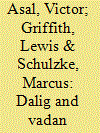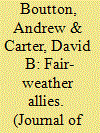|
|
|
Sort Order |
|
|
|
Items / Page
|
|
|
|
|
|
|
| Srl | Item |
| 1 |
ID:
137029


|
|
|
|
|
| Summary/Abstract |
Many authoritarian regimes selectively provide critical segments of the population with privileged access to goods and services, expecting political support in return. This article is interested in the effects of this regime strategy: Is violent opposition less likely to occur in subnational regions bound to the ruling elite through such patron–client networks? For its empirical analysis, the article makes use of crowdsourcing data on the number and geospatial distribution of fatalities in the Syrian civil war from March 2011 to November 2012. In terms of selective goods provision, the focus is on the electricity sector. Satellite images of the earth at night are used to proxy spatial variations in the public distribution of electricity in times of power shortages. These data are complemented with information from the last Syrian population census of 2004. Estimations from fixed effect logit models lend support to the hypothesis that the risk of violence has been lower in subdistricts that have been favored by the ruling regime in terms of preferential access to material goods. This hypothesis is further corroborated with qualitative evidence from Syrian localities.
|
|
|
|
|
|
|
|
|
|
|
|
|
|
|
|
| 2 |
ID:
134940


|
|
|
|
|
| Summary/Abstract |
This article reflects on the importance of linking micro and macro levels of analysis in order to advance our current understanding of civil wars and political violence processes and discusses the contributions of the articles in this special issue. We first identify the main problems in research on political violence that is focused on a single level of analysis and describe the challenges faced by research that attempts to establish connections between different levels. We then introduce the different articles in the special issue, with an emphasis on the micro–macro-level linkages they develop and highlighting their commonalities. We conclude by emphasizing the importance of a new research agenda for the study of civil wars and political violence that bridges social, economic, and political dynamics occurring at the local level and conflict processes taking place in the macro arena.
|
|
|
|
|
|
|
|
|
|
|
|
|
|
|
|
| 3 |
ID:
137065


|
|
|
|
|
| Summary/Abstract |
This article examines the destabilizing impact of rapid-onset, climate-related disasters. It uses a sample of storms and floods in conjunction with two intensity measures of civil unrest to examine two perspectives on human reactions to disasters (conflictual, cooperative). It also uses insights from the contentious politics literature to understand how emotions posited by the conflictual perspective are transformed into destabilizing acts. While the data show that mean levels of unrest are higher in the wake of disasters, the means poorly reflect the data: the vast majority of episodes do not show higher levels of unrest. Moreover, even when higher levels of unrest emerge, they are not a simple reflection of disaster's human impact; this underscores the importance of the transformational process. Thus, a preliminary model of political violence is investigated; it employs impact, process and institutional variables and it explains three-quarters of the variance in the intensity of violence.
|
|
|
|
|
|
|
|
|
|
|
|
|
|
|
|
| 4 |
ID:
135339


|
|
|
|
|
| Summary/Abstract |
Anarchy was coming to Africa, Robert Kaplan warned in 1994, and a surge in conflict initially seemed to confirm that prediction. With less fanfare, however, after the year 2000, conflict in Africa declined, probably to the lowest levels ever. Recent fighting in Libya, Mali, South Sudan and elsewhere has prompted a new wave of ‘Africa falling apart’ concerns. This article reviews the history and data of conflict in Africa, from pre-colonial times to the present. Historical comparison and quantitative analysis based on the Uppsala Conflict Data Program (UCDP) and Major Episodes of Political Violence (MEPV) datasets on the 1961–2013 period show that Africa has experienced a remarkable decline in warfare, whether measured in number of conflicts or fatalities. Warfare is a relatively low risk to the lives of most Africans. The years 2010–2013 saw an increase of 35 per cent in African battle deaths over 2005–2010, but they still are 87 per cent lower than the 1990–1999 average. Changes in external support and intervention, and the spread of global norms regarding armed conflict, have been most decisive in reducing the levels of warfare in the continent. Consequently, there is no Africa exception to the systemic shift towards lower levels of armed conflict.
|
|
|
|
|
|
|
|
|
|
|
|
|
|
|
|
| 5 |
ID:
136170


|
|
|
|
|
| Summary/Abstract |
For classes which contain a discussion of strategy, war, political violence, terrorism, insurgency, peace operations, or ethno-nationalist conflict to name a few, students must have an effective, foundational understanding of the complexities of using military force. To that end, we have developed an operational “battlefield” exercise, the Dalig–Vadan Exercise (DVE), which allows an entire class of students to get a sense of the dynamics and complexities of command and execution of competing strategies without any military background, any particular emphasis on time, place, or context, and de-emphasizing the consequences of violence. Anchored on Clausewitz's friction and fog, the DVE provides students with a first-person encounter with decision making in a dynamic, multiparty, informational-limited, and time-sensitive environment that can be related to a wide range of courses and course material in international relations and related fields.
|
|
|
|
|
|
|
|
|
|
|
|
|
|
|
|
| 6 |
ID:
134933


|
|
|
|
|
| Summary/Abstract |
While it is commonly assumed that the United States uses foreign aid as an instrument to combat global terrorism, it is unclear whether it views terrorist threats to other countries, particularly its allies, with urgency. We show that the relationship between transnational terrorism and foreign aid flows is strongly conditional on whether terrorist activity based in a potential recipient directly threatens the United States. Using data on terrorist attacks and casualties in potential recipient countries, we demonstrate that terrorist activity based within a state’s borders, which targets US interests is a strong determinant of both whether that state receives any aid and also how much aid it receives. In contrast, the presence of terrorism targeted at non-US interests, even if it targets formal allies of the United States, is generally unrelated to US aid allocation. These findings suggest that the United States' use of foreign aid to fight terrorism and political violence is narrowly tailored to assist countries that directly threaten its own security, rather than those of other countries, even its allies.
|
|
|
|
|
|
|
|
|
|
|
|
|
|
|
|
| 7 |
ID:
136094


|
|
|
|
|
| Summary/Abstract |
A large literature demonstrates that civil war is recurrent: States that have already experienced such conflict tend to relapse back into war. How might this ‘conflict trap’ be escaped? We answer this question with a focus on gender. Women tend to exist at the margins of society, and postwar society often perpetuates prewar values. Yet this continuity is not inevitable. We argue that the end of a civil war opens a window of opportunity through which women may increasingly participate in society, economics, and politics. Given women's preference for peace and aversion to political violence, we expect this increased participation to reduce the risk of relapse to civil war. Large-N analyses support our argument, and in particular suggest that increases in female literacy and parliamentary representation reduce the risk of relapse.
|
|
|
|
|
|
|
|
|
|
|
|
|
|
|
|
| 8 |
ID:
134456


|
|
|
|
|
| Summary/Abstract |
This analysis uses survey data representing three of the world’s most populous Muslim majority countries to challenge conventional wisdom on what shapes Muslim public opinion on political violence against the United States. It improves previous analysis by clearly distinguishing support for violence against civilians from support for violence against military targets and by featuring independent variables that clearly separate views on US foreign policies from views on US culture. Logistic regression shows that, among Egyptian, Pakistani and Indonesian Muslims, perceptions of controversial US policies toward Israel, Middle Eastern oil, or the perceived attempt to weaken and divide the Muslim world are not related to support for attacks on civilians in the United States, but only to support for attacks on US military targets. Approval of attacks on US civilians is shaped, instead, by negative views of US freedom of expression, culture, and people, disapproval of the domestic political status quo and the notion of general US hostility toward democracy in the Middle East. This last finding has important implications for US and Western policies toward the post-Arab Spring Middle East in particular and the broader relationship with the Muslim World in general.
|
|
|
|
|
|
|
|
|
|
|
|
|
|
|
|
| 9 |
ID:
134696


|
|
|
|
|
| Summary/Abstract |
To speak of what is exceptional about Northern Ireland today requires a provocative sense of irony, for constitutionally it can be argued Northern Ireland has become one of the most stable parts of the United Kingdom. The fact if not the value of the Union has become more deeply entrenched as both the fact and the value of the Union have come more openly into play elsewhere, even in England. Nevertheless, Northern Ireland is not immune from larger political developments and fantastic uncertainties attend consideration of the next twenty years at different levels of analysis. This article considers these uncertainties according to two possible scenarios, one involving a nationalist narrative and the other involving a unionist narrative. The key issues in each scenario and narrative are the constitutional debate in the United Kingdom, especially the referendum on Scottish independence; the future of the European Union and the United Kingdom's relationship to it; and the changing electoral demographic within Northern Ireland. If Northern Ireland's future is inextricably linked to uncertainty this makes it the rule and not the exception today.
|
|
|
|
|
|
|
|
|
|
|
|
|
|
|
|
| 10 |
ID:
135914


|
|
|
|
|
| Summary/Abstract |
Kalev Leetaru is the creator of GDELT (Global Database of Events, Language, and Tone), a comprehensive, open source data set that aggregates news media to track political events and protests throughout the world, as well as the people, organizations, themes, and emotions underlying them. He just finished a term as the 2013–2014 Yahoo Fellow at the School of Foreign Service at Georgetown University and is working to expand the GDELT project. Leetaru provided the Journal with insight regarding the origins of the database, some of its complexities, new developments, and his vision for how GDELT can forecast future uprisings and political violence to help those affected.
|
|
|
|
|
|
|
|
|
|
|
|
|
|
|
|
| 11 |
ID:
136091


|
|
|
|
|
| Summary/Abstract |
This article develops a conceptual framework to explain that a rebel group, in war-to-peace transition, is likely to use violence in contested areas in order to reclaim its control over territory and populations. The decision to use violence, however, depends on whether post-accord elections are held prior to the demobilization of rebel combatants. Use of violence would still be a preferred strategy for a rebel group should the participation in elections fail to produce the expected outcome. Violence influences post-conflict elections, and when the use of violence determines an electoral outcome, parties involved in the peace process may find it difficult to reconcile their differences on peace agreement implementation. District-level data from Nepal are used to test the arguments, and the effect of post-accord violence on peace processes is evaluated in a comparative perspective.
|
|
|
|
|
|
|
|
|
|
|
|
|
|
|
|
| 12 |
ID:
135464


|
|
|
|
|
| Summary/Abstract |
Rammanohar Lohia (1910-1967) was an unusual politician, who was highly educated, committed to the cause of the common people, and was proud of India with its past glory, religious traditions, ethnic diversity and geographical expanse. He had no hesitation in seating, conversing and sharing his social thoughts and political ideas with young and old, men and women, illiterate and highly accomplished scholars, simplest rural folk and sophisticated literati and, in fact, anybody and everybody. He believed in mass mobilization on the issues of common and public interests and he had no time to relax as long as he was alive. He was a restless soul, who was perennially travelling to distant and difficult parts of the country and sharing lives of the co-workers through the length and breadth of the country. He was a mobile dynamo, who was restless to reach each and every corner of the country with his brand of message for the resurgent India. He was a Gandhian, who did not feel obliged to be imprisoned in the creed of non-violence; he was a proud Hindu, whose life centered around Hindu–Muslim unity; and he was a Hindi zealot, who desired healthy growth of all the Indian languages. He began his political career as a Congressman, but soon gravitated to socialist ideology and remained a diehard socialist till the end. He was one of the founders of the Congress Socialist Party (CSP), Socialist Party (SP), Praja Socialist Party (PSP), and Sanjukta Socialist Party (SSP) of India. He was one of most vocal critics of the Indian National Congress, the ruling party of the newly independent India and its popular Prime Minister, Jawaharlal Nehru.
|
|
|
|
|
|
|
|
|
|
|
|
|
|
|
|
| 13 |
ID:
134724


|
|
|
|
|
| Summary/Abstract |
Neurobiological advances appear critical for explicating individual differences in attitudes, values, behaviors, cognition and evaluation, but only recently has the neurobiological tool kit been applied to questions of interest in international relations. In this review, we first provide an overview of historical approaches from two domains of enduring interest to the field: leadership and political violence. We then explicate the ways that the neurobiological revolution has so far furthered our understanding of these domains.
|
|
|
|
|
|
|
|
|
|
|
|
|
|
|
|
| 14 |
ID:
134695


|
|
|
|
|
| Summary/Abstract |
The historic significance of the Good Friday Agreement and its role in ending organized political violence is acknowledged at the outset. The article then goes on to probe the roots of the political paralysis built into the architecture of the Agreement that are predicated on a misplaced political and cultural symmetry between the “two communities.” It is suggested that the institutionalized relationship between Northern Ireland and the rest of the U.K. facilitates a cross-party, populist, socio-economic consensus among the nationalist and unionist political parties on the welfare state, taxation and maintaining the massive British subvention to the region. This in turn allows them to concentrate on a divisive culturalist politics, i.e., on antagonistic forms of cultural and identity politics over such issues as flags, parades, and the legacy of the “Troubles” which spills over into gridlock into many areas of regional administration. The article argues for a much broader understanding of culture and identity rooted in the different, if overlapping and interdependent, material realities of both communities while challenging the idea of two cultures/identities as fixed, mutually exclusive, non-negotiable and mutually antagonistic. It then focuses on the importance of Belfast as a key arena which will determine the long-term prospects of an alternative and more constructive form of politics, and enable a fuller recognition of the fundamental asymmetries and inter-dependence between the “two communities.” In the long run, this involves re-defining and reconstructing what is meant by the “Union” and a “United Ireland.”
|
|
|
|
|
|
|
|
|
|
|
|
|
|
|
|
| 15 |
ID:
134520


|
|
|
|
|
| Summary/Abstract |
Conventional wisdom suggests that reports of terrorism should be sparse in dictatorships, both because such violence is unlikely to result in policy change and because it is difficult to get reliable information on attacks. Yet, there is variance in the number of terrorist attacks reported in autocracies. Why? We argue that differences in the audience costs produced by dictatorships explain why some nondemocracies experience more terrorism than others. Terrorists are more likely to expect a response in dictatorships that generate high domestic audience costs. Using data from multiple terrorism databases, we find empirical evidence that dictatorships generating higher audience costs—military dictatorships, single-party dictatorships, and dynastic monarchies—experience as much terrorism as democracies, while autocracies generating lower audience costs—personalist dictatorships and non-dynastic monarchies—face fewer attacks than their democratic counterparts
|
|
|
|
|
|
|
|
|
|
|
|
|
|
|
|
| 16 |
ID:
135989


|
|
|
|
|
| Summary/Abstract |
Given various challenges to national security in democracies, such as terrorism and political violence, a growing need for reconceptualization of the term “resilience” emerges. The interface between national security and resilience is rooted in individuals’ perceptions and attitudes toward institutions and leadership. Therefore, in this article, we suggest that political–psychological features form the basis of citizens’ perceived definitions of national resilience. By comparing national resilience definitions composed by citizens of two democratic countries facing national threats of war and terrorism, the United States and Israel, we found that perceived threats, optimism, and public attitudes such as patriotism and trust in governmental institutions, are the most frequent components of the perceived national resilience. On the basis of these results, a reconceptualization of the term “national resilience” is presented. This can lead to validation of how resilience is measured and provide grounds for further examination of this concept in other democratic countries.
|
|
|
|
|
|
|
|
|
|
|
|
|
|
|
|
|
|
|
|
|